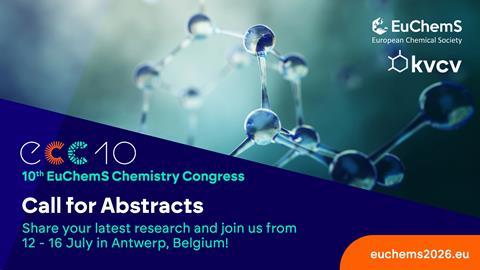From 12-16 July 2026, Antwerp is the place to be for chemists from all specializations as the city hosts the 10th EuChemS Chemistry Congress. C2W International had a quick chat with Kim Jelfs, professor of Computational Materials Chemistry at Imperial College London and plenary speaker at ECC10.
Why did you accept the invitation to speak at ECC10?
‘I haven’t attended an EuChemS conference before, but I like these big, cross-cutting conferences. They broaden your horizon, specifically the plenary speakers, and you can stay in your niche in the parallel sessions or try something new there as well. I always try to dip into other fields at such meetings, but I will also attend sessions that are really in my specific area. And I haven’t been to Antwerp yet, so this is a nice opportunity to visit the city.’
What is your take on the current state of the chemistry field considering the challenges ahead and the chemical industry going through rough times?
‘My area is digital chemistry and AI and there I see that Europe definitely has the opportunity to lead. Many companies are far ahead this field and when we apply AI to become more efficient, we create room to focus more on the creative side of chemistry. Also, today’s students are learning these skills and with these new generations coming up, we have a new group of chemists who can work on this. I see plenty of AI start-ups doing chemistry in all areas, and I have several group members working in such start-ups. It’s just a new role for them.’
Do you see AI catching on among chemists in more “conventional” areas?
‘Yes, also in the broader field, I see that awareness about the opportunities of AI is growing. Of course, there is also skepticism and that is OK. A problem for chemists is that we don’t have enough data yet for training, particularly on failures. And a lot of the work in chemistry concerns failures, but it is not that straightforward to report failures in a useful manner. You have to analyze and describe the failures, but right now there is no incentive to do so. I hope that the automated platforms will help out because they also register failure data.’
Why should young researchers attend ECC10?
‘It is a great way to listen to some of the big names in the field and broaden your horizon and at the same time, to meet people who are in your specific field. I still have so many contacts with people that I met years ago at conferences. It’s a great way to start collaborations. So, it’s all in one at such a big event. And of course there’s the opportunity to present your own work. ’
What will make the conference a succes for you?
‘When I come away with new ideas and having met new people.’














Nog geen opmerkingen